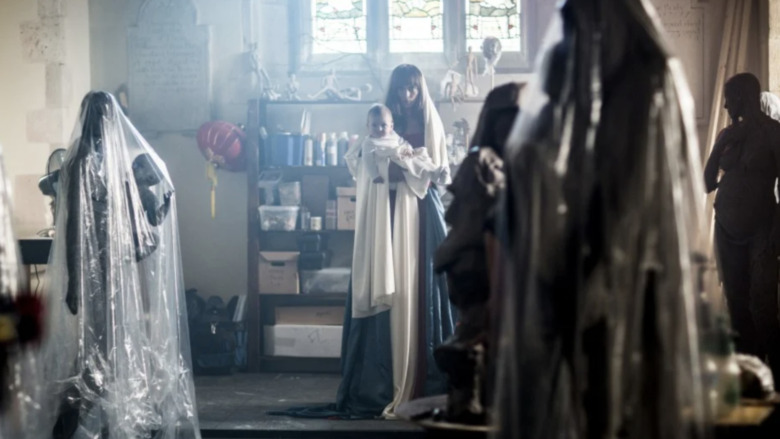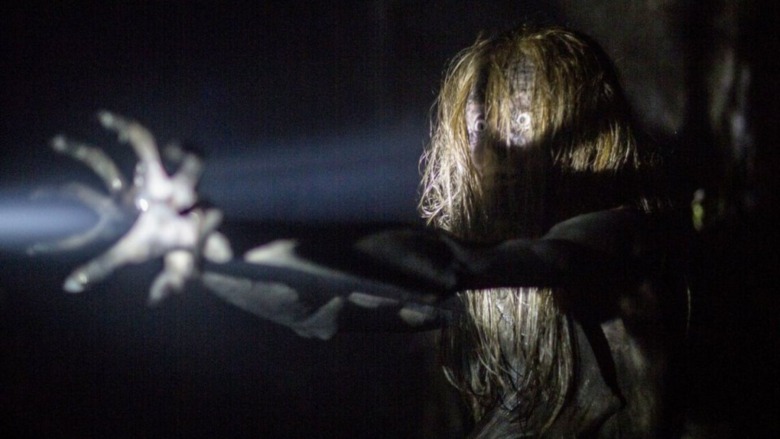The Ending Of Don't Knock Twice Explained
Actress Katee Sackhoff, most known for her iconic roles as Lieutenant Kara "Starbuck" Thrace in "Battlestar Galactica", Bo-Katan in "The Mandalorian", and many more, took a detour into the horror genre in 2016 with the film "Don't Knock Twice". The movie focuses on Sackhoff's character Jess, a former drug addict who is now a successful sculptor with a new husband. After almost a decade apart, Jess wants to reconnect with her daughter, Chloe, played by Lucy Boynton ("Bohemian Rhapsody"), a young woman who holds a lot of resentment against her mother for putting her in the foster care system nine years earlier. When Jess offers to have Chloe come live with her and make up for lost time, Chloe initially says no, but this all changes when she finds herself being chased by a demon from a local legend.
In "Don't Knock Twice," Chloe hears about the death of Mary Aminov, an old woman who she believes kidnapped her childhood friend a long time ago. There's a rumor around town that if you knock twice on the front door of her old house, Mary's ghost will come and take you away. Of course, Chloe can't resist the challenge and does just that. At first, nothing seems to happen, but soon enough Chloe's life is tormented by not only the ghost of Mary, but also the demonic presence of Baba Yaga, a figure from Slavic legend. While "Don't Knock Twice" didn't get great reviews, evident in its 23% on Rotten Tomatoes, many praised the two lead actresses's "fierce, emotionally committed performances" (The Hollywood Reporter). The film also inspired a successful VR video game adaptation of the same name.
But what really happens in the Baba Yaga-centered horror film? Here's the ending of "Don't Knock Twice" — explained.
The fate of Jess and Chloe
Jess and Chloe unfortunately do not escape their dark fate. After Baba Yaga catches Chloe and drags her to her realm, Jess finds a way to enter and rescue her daughter. Finally back home, the two women are relieved that the door to Baba Yaga's home is finally closed — or not? In a huge twist in the final moments of the movie, it is revealed that Jess is now a servant of Baba Yaga, and Chloe will likely be her first sacrifice.
"Don't Knock Twice" mainly focuses on the theme of motherhood. This is a major recent trend in the horror genre, with the most prominent example of another film tackling this theme being the well-known 2015 horror film, "The Babadook". In "Don't Knock Twice", Sackhoff's Jess constantly sees herself mirrored — both literally and figuratively — in the motherly figures of Baba Yaga and Mary. When Jess has a nightmare witnessing the self-inflicted death of Mary, Jess quickly sees the old woman's face morph into her own. Like how Mary kills herself in an attempt to escape her fate kidnapping children for Baba Yaga, in a way Jess tries to escape the burden of motherhood when she puts Chloe in foster care years earlier.
No matter if the women are well-intentioned or not, these decisions end badly for both of them. Mary's soul becomes trapped in her old house, while Jess's daughter goes through years of struggle, leading her to resent and blame her mother. Then when Jess tries to save Chloe from Baba Yaga and make up for past failures, she ends up dooming both her and her daughter to a worse fate.
The horrific truth of Tira, Mary, and the demon Baba Yaga
While the blame could be put on Chloe for knocking twice on Mary's front door, Jess's supposed friend Tira (Pooneh Hajimohammadi) has a lot to do with all the bad things that happen to Jess and Chloe. Tira is first introduced in the film as the subject of Jess's new sculpture, modeling as Mary from The Bible, another major mother figure. In this case, Tira's angelic image is all a facade.
Early on, Tira gives Jess a talisman necklace claiming it's for protection. When things with the demon start to get bad and Jess and Chloe don't know what to do, they go to Tira for answers about Mary and Baba Yaga, believing her to be knowledgeable and trustworthy. Instead of helping them, Tira leads Jess to think that Detective Boardman (Nick Moran) is really behind the missing children, not Mary.
In the end, "Don't Knock Twice" reveals that this is all a ploy to get Jess to trap and sacrifice Boardman to Baba Yaga, as Tira is a servant of Baba Yaga all along. Throughout the film, Tira is trying to transfer her status to Jess and gain her freedom, and she succeeds. Through her trickery, Tira gets Jess to commit a truly evil act when she leads Boardman to his death. In the final scene of the film, the necklace that Tira gives Jess burns her, transferring the mark of Baba Yaga's slave from Tira to her. The door to Baba Yaga's realm opens once again and the demon beckons her new servant to her side.
The real legend of Baba Yaga throughout history
Although Baba Yaga makes for a great horror creature in "Don't Knock Twice", the film doesn't quite portray an accurate version of the historical Slavic legends. "Don't Knock Twice" embraces the dark side of the mythological figure and how stories depict her as devouring people, mainly children, but her nature is not as simple as the film suggests.
Many Slavic people believe Baba Yaga to be a shaman of sorts, someone people in old legends even sought out when "looking for wisdom, knowledge, truth or help" (Myths and Legends). The old, wise witch is generally shown as living in a magical house in the woods, and "when someone enters the hut, they live or die depending on what they say and do." As a figure of great power, many Slavic people think that Baba Yaga must be respected, and she tends to represent respect for nature as well. While she may be capable of villainous things, the Baba Yaga of legend doesn't hunt down people, and she will only turn dangerous if you are ill-intentioned, disrespectful, or malicious in any way. Depending on the visitor's actions, Baba Yaga may either help them greatly, or like in "Don't Knock Twice", eat them.
In "Don't Knock Twice", Baba Yaga is a demonic creature with no morals or reasoning behind its actions. It wants to enslave and devour as many people as possible, and that's about it. The film simplifies the legend to a degree, but it works very well, creating a truly frightening demon worthy of some intense nightmares.



